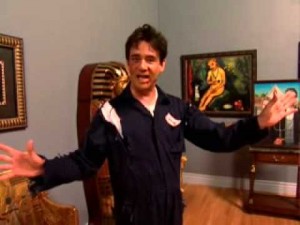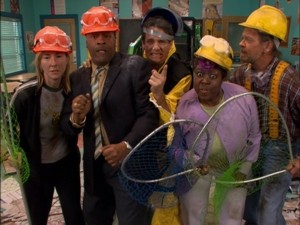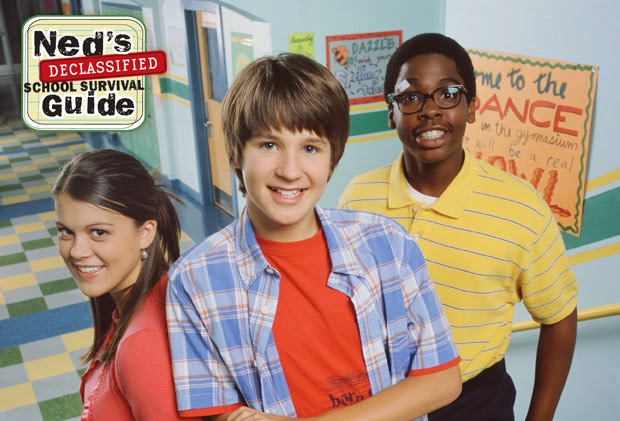 I have no logical reason for Ned’s ranking so highly. The notion that it’s “better” than many of the shows ranked lower on the list is ridiculous — mainly because the show is ridiculous. And yet I must follow my heart. I must chase that flutter of joy I get when I hear its cheesy theme song. I must honor the constant smile it brings to my face, so here it is.
I have no logical reason for Ned’s ranking so highly. The notion that it’s “better” than many of the shows ranked lower on the list is ridiculous — mainly because the show is ridiculous. And yet I must follow my heart. I must chase that flutter of joy I get when I hear its cheesy theme song. I must honor the constant smile it brings to my face, so here it is.
Even if it’s not The Wire, it IS a truly unique and wonderful show. It’s smart and self-referential enough that it would be labeled a “cult hit” if it was aimed at an older audience. Because it’s a kid’s show, it’s more or less disappeared. I don’t want this to happen.
Ned’s Declassified School Survival Guide ran for three seasons on Nickelodeon. It’s a comedy about a wacky, surreal middle school, focusing on three central characters: the titular Ned Bigby and his two best friends, Jennifer “Moze” Mosely, and Simon “Cookie” Nelson-Cook.
So what is it about this tween-centric comedy that so inspired my love that it nearly ranked in the top 20? Let me count the ways:
1) The manic pace
Each half hour episode (22 minutes minus commercials) is broken into two halves, and that’s part of the charm of the show: the unprecedented, zany pace. Eleven minutes per episode, with many episodes having A, B, C, and sometimes even D stories! That’s insane!
But it means you’re never going to be bored. The ADHD pace of the show, of course, means an absence of subtlety or elegant plotting. Things happen quickly, and then the episode is done. It’s a fun rush.
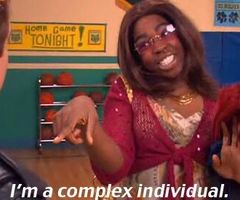 2) The absurdity and the gonzo plot points
2) The absurdity and the gonzo plot points
Ned’s is packed to the brim with insanity and strangeness. Some of this comes from jokes, some of it comes from plot twists — Cookie attempts to ask a supermodel to the school dance but accidentally ends up taking a German Shepard — and some of it comes from the wacky premises — the school trying to perform an “atomic flush” of all the toilets at once.
The majority of the strangeness comes at the expense of Cookie. He’s involved in some truly bizarre stuff. He frequently cross-dresses (“seeee ya!”), speaks in a fake British accent for an episode, digs a tunnel beneath the school, records a country song (“Cowboy Cookie!”), and more.
But the absurdity is not compartmentalized to Cookie — everyone has bits of weirdness. Many of the side characters are intrinsically gimmicky and ridiculous (more on them in a minute), and the other main characters are plenty unpredictable.
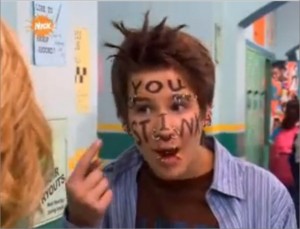 3) The strange subversiveness
3) The strange subversiveness
Yet, for as unbounded as reality often seems at Polk, there’s something very focused about many of its plots. Particularly — again — many of Cookie’s plots have a dark, satirical edge. Cookie is always looking for an easy way out of any problem, often through technology.
Though Ned’s seems, on the surface, a show for the Internet age, with three or four plots packed into just over ten minutes, the show seems inspired by an old-school aesthetic and mindset.
Ned, the hero, works hard to develop strategies that he hand-writes in a notebook. There’s no reliance on technology, no shortcuts with his approach.
(Speaking of the “Tips,” since they’re a central component of the show’s structure: They start the show a bit distracting and frequent, but eventually they’re used less and less. By the third season, they’re used primarily to point out the moral of each episode.)
All of this is an undercurrent more than an overtone, mind you; there’s something cynical in the hearts of the creators of this show, I think, even if the surface is a light-hearted comedy.
4) The innuendo
I’ll keep this section short — there is a LOT of innuendo and arguably-sexual jokes and imagery in this show. Once you start seeing it, you can’t STOP seeing it. I trace this back to the show’s obvious appreciation for old Looney Tunes cartoons which were very much the same way.
One of the best characters in the show is Gordy, the janitor. Played by the fantastic Daran Norris — a great improviser and voice actor best known for voicing half of the characters on The Fairly OddParents — the lazy custodian doesn’t have nearly as much screen time as the other leads, but steals every scene he’s in. He also lands a bunch of jokes that would fly over younger viewers’ heads.
His ongoing plot, starting from the first episode and spanning the whole series, is his attempt to catch a weasel loose in the school. It allows Norris to use plenty of physical comedy along with his great lines.
6) The chemistry
Watch enough kids shows (and I’ve watched my fair share, both because I have several younger siblings and because I kind of enjoy some of them) and you quickly realize that most kids and tweens can’t act worth crap. And while the leads of Ned’s aren’t likely to win any Oscars in their careers, they do have something special: a rare, brilliant level of comic chemistry with each other.
Daniel Curtis Lee as Cookie is probably the exception. He’s a whirlwind of wackiness that consumes even the most insane plotlines. But he’s not a “great” sitcom actor in the way you’d use that word, overacting with limited expressiveness.
The other two leads, though, could be lifelong comedy leads. If I were casting a sitcom, I would call their agents. Lindsey Shaw (who has rightfully landed a few major gigs since Ned’s ended) is delightful as the aggressive tomboy Jennifer Mosley. She also manages to give the character a lot of depth. Credit both the writing and the acting — Moze is a very well-written character not just by kids’ show standards, but by TV standards, period. (Though that’s not saying much).
 Even better is Devon Werkheiser playing title character Ned (though Moze is better-written than Ned, usually). Devon has that uncommon automatic charm, and it’s necessary to ground a show like this. He plays well with every other actor on the show, especially Norris (Gordy) and especially especially Shaw (Moze).
Even better is Devon Werkheiser playing title character Ned (though Moze is better-written than Ned, usually). Devon has that uncommon automatic charm, and it’s necessary to ground a show like this. He plays well with every other actor on the show, especially Norris (Gordy) and especially especially Shaw (Moze).
(Werkheiser is also one of my interview “white whales.” I would super-love to chat with him. You can tell from his social media presence that he’s a really laid back, interesting dude. I’ve messaged him twice on Twitter asking if he wants to interview for Earn This, and emailed his booking agency once, but never heard back. Werkheiser’s post-Ned’s acting career has been underwhelming, but I’m guessing that’s because he targeted a music and chill-vibes career.)
The scenes that Workheiser and Shaw share are reliably enjoyable, and the episodes that focus on Ned and Moze’s platonic but turbulent friendship are always among the best.
7) The pop culture references and trope remixes
 Ned’s is sneaky-smart, as I discussed in point 3. One effect of that is tons of pop culture homages. Some of them are very specific — like a shot recreating the famous poster for Attack of the 50-Foot Woman.
Ned’s is sneaky-smart, as I discussed in point 3. One effect of that is tons of pop culture homages. Some of them are very specific — like a shot recreating the famous poster for Attack of the 50-Foot Woman.
Others are much more general — episodes borrow from a bunch of different genres, from mystery to horror to soap opera to sci-fi to sports movies to classic sitcoms to documentaries and more. Especially in the second and third seasons, many episodes have some sort of genre-focused twist (much like another beloved show, Community).
8) The self-referential jokes and side characters
One of the very first shots in the show: A character with an absurdly huge backpack, with a voiceover from Ned about how, on the first day of school, you do not want to bring in a backpack that’s too big.
Throwaway joke, right? Nope — “Backpack Guy” immediately becomes a recurring side character, never losing his ridiculous backpack. The show is constantly piling on characters who could have been one-time jokes, but who recur and maintain their ridiculous traits. (E.g.: Seth, the athlete, is always spinning a basketball on his finger.)
It adds a satisfying layer of depth that previous punchlines and guest characters return. It’s not quite as cleverly self-referential as Arrested Development, but it’s definitely a “lite” version of that. You feel very rewarded as a fan who watches every episode in order and gets to know the characters.
There are also recurring bits — like the use of cardboard cutouts as a distraction — that add some extra spice (and absurdity) to the show.
There’s even some fantastic meta-humor in the show: The seventh episode has a very funny plot about Cookie basically casting himself, a reference to the actor for Cookie was recast. A second-season episode features a bizarro version of the eponymous “School Survival Guide,” while later episodes have Ned losing or quitting the “Guide” (to which the characters joke they wouldn’t know what to do!)
9) The cheesy yet intriguing romance
By the end of the second season, the show started serializing its romantic storylines. Rather than have Suzie be the popular-girl crush Ned would never date, the writers finally let them get together and let the social dominoes fall. Because the show at that point had developed such a huge roster of strange, enjoyable side characters, the show’s quest to try dozens of permutations of characters pining after each other and sometimes getting together proved very satisfying.
It all builds towards the series finale as the third season sets up several love triangles. Speaking of the finale…
10) The balls-to-the-wall finale
It’s not at all perfect: The plot about art thieves is way out of the show’s realm, and I wish more of it had taken place in the halls of Polk. I wish that it had gone even harder on the use of inside jokes to thank fans, and Loomer’s rapid reinvention had felt more true to character.
But everything else? Fantastic. Brilliant. That’s how you end a show.
(Spoiler warning for the third season and finale of Ned’s, if you care at all.)
So it was pretty clear from the start of the third season, if not much earlier, that the show’s endgame was Ned and Moze realizing how much they love each other and getting together. But the way it played out over the final couple episodes — Faymen and Suzie moving away, Ned and Moze alternately pining for each other, Suzie making a surprise return — amps up the anticipation for the finale.
You could’ve guessed them getting together, but you probably wouldn’t have guessed how sweetly the finale did it. The episode has one of my favorite uses of a song in a TV show ever: Ned reminiscing to Old 97’s “Big Brown Eyes.”
Similarly fantastic is the staff’s plot at Polk. If your show takes place almost entirely in a school that the kids are leaving behind at the end of the show, what is the ultimate thing you can do to send off the school and show? What’s the most apocalyptic way to go out? Yep: They literally tear the school down.
There’s also some good meta-commentary and closure: Cookie directly faces his habit of trying to find the easy way out and has to do something manually, stop art thieves. Ned turns into a “wild man” while Suzie wonders why the hell he’s so crazy — a good commentary on the show’s strange relationship with reality.
And there are ninjas, because why the hell not?
It was such a bonkers and badass way for the show to end — Gordy demolishing the school (the actor actually destroying the set) as he hunts for the weasel — that it more than makes up for the finale’s flaws.
I tend to feel underwhelmed by series’ finales. I always want finales to both honor the tone of the show and go out on some big climactic note of finality. I want finales to tie up the show’s conflicts and give us satisfying conclusions for our characters while still telling contained stories. I want to be amazed and nostalgic all at once, and I want to have my questions answered. I want to eat my cake, and I want to have it.
That’s why I consider Ned’s quite possibly my favorite finale ever. It hits all of the notes I wanted and has an appropriately gonzo, insane conclusion for a show that was always so wild.
The show ended before it started losing steam, so there was never a feeling of wading through the muck that often tinges long-running comedies. Yet I also felt like not much was left on the table — the show ended pretty much exactly when it should have.
In conclusion
I’ve never seen anything quite like Ned’s. It’s wacky but warm-hearted, and it develops characters and relationships in a satisfying way. On top of that, it has some of the most absurd humor you’ll see in any show, kids’ or otherwise. Part Wayside School, part Looney Tunes, Ned’s is a show I keep coming back to.
Some other thoughts on Ned’s:
- I failed to discuss any of the adults in this show except Gordy. The teachers are less interesting than the students, but there are a few highlights: One is Vice Principal Crubbs, dressed in Miami Vice pastels. He is the only one to come close to matching Cookie in hammy, over-the-top acting. I mean that as a compliment.
- Beyond Gordy, my favorite adult is Mr. Sweeney. The show develops the relationship between the science teacher and Ned perfectly, treading the line of annoyance tinged with affection perfectly. (I really bought, and was moved by, the moment in the finale when Sweeney tells Ned he was one of his favorite students.)
-

Suzie Crabrgass <3
The gorgeous Christian Serratos plays Suzie Crabgrass, Ned’s crush (and one of my Nickelodeon high school TV crushes, along with Mindy Crenshaw). Though I found her less engaging as a character and actress than Shaw as Moze — they basically write her as semi-bitchy, and it seems to be because that’s Serratos’ natural state — Serratos has gone on to the biggest career of the Ned’s alums, appearing in major roles in Twilight films and, more recently, The Walking Dead.
- In case you didn’t believe me that the show piles on recurring characters, Wikipedia counts 53 recurring characters on top of the five credited leads (Jim Bullock receiving credit as a lead was always ridiculous, BTW).
- ”iTeacher,” played by the indispensable Mo Collins, was a strange addition to the second season (never working as well as Vice Principal Crubbs, a similar addition). I always felt like the show was trying to do something strange and original with the idea of a computer-based teacher but never figured out what that was.
- Cookie should TOTALLY have ended up with Evelyn, not Lisa. There were sparks there, even if they were borderline violent sparks.
- On the topic of characters the show never quite figured out, I never really could embrace Faymen as anything other than an obstacle to an inevitable Moze-Ned hookup. Not much happening there.
- While the show did figure out Missy as a great villain, I’m not a fan of the episodes where she pines after Ned. It’s borderline wish fulfillment — why would the popular girl aimlessly want to be with a dopey guy? Way out of place.
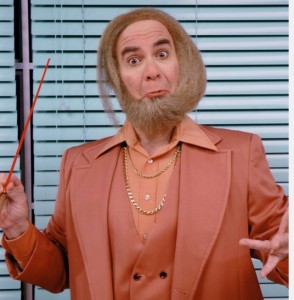 FUCKING BEARD COMBOVER. This show, guys. There is literally a character whose gimmick is that he has a beard combover.
FUCKING BEARD COMBOVER. This show, guys. There is literally a character whose gimmick is that he has a beard combover.- As great as Beard Combover Guy is, my favorite side character is probably the psychic Lunch Lady Rose.
- Sometimes you don’t notice a joke until the third time you watch an episode. When I watched the “Tutors” episode, it took me awhile to catch that the C-plot has to do with Timmy… who is known for farting… who is a “tooter”… sigh…
- I always loved that the episode credits included outtakes. Every comedy should be required to do this.
- If I ever finish my Wonder Years recaps, this show is a strong candidate for episode-by-episode discussion. Any thoughts on this?


